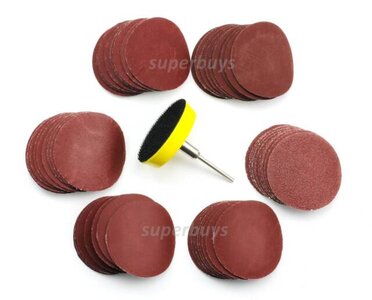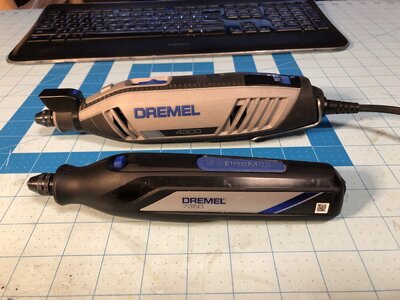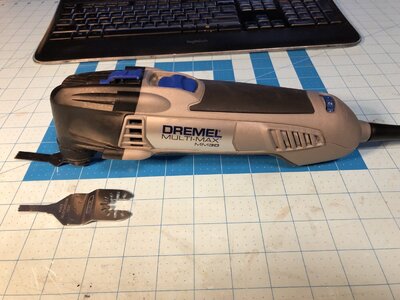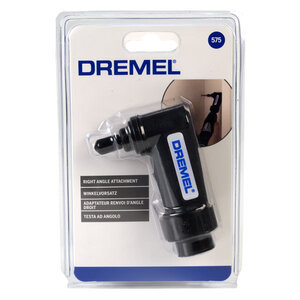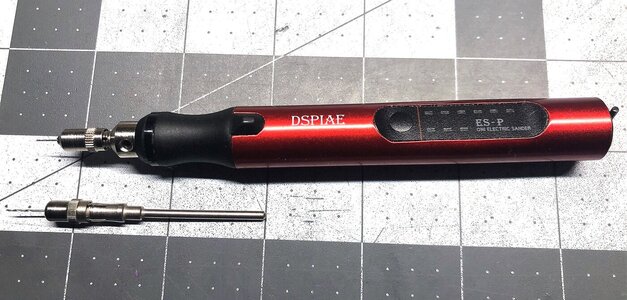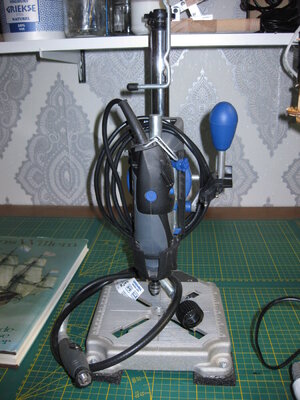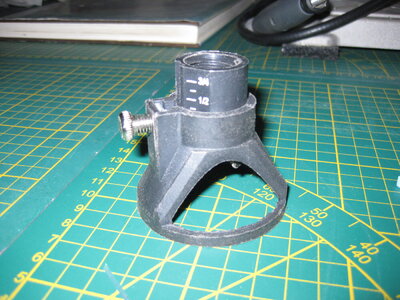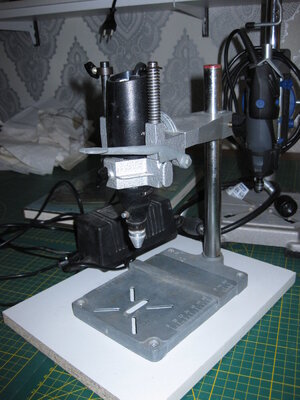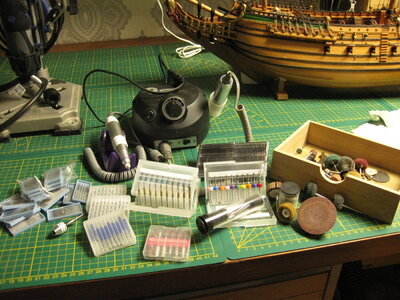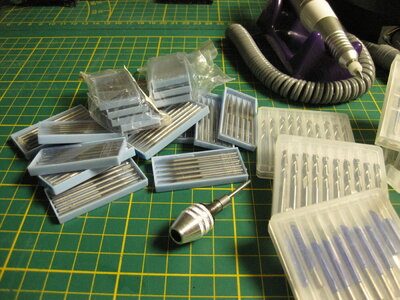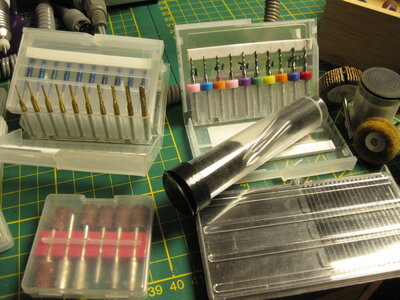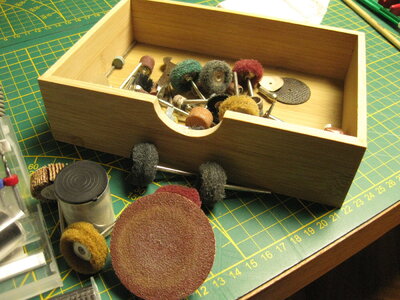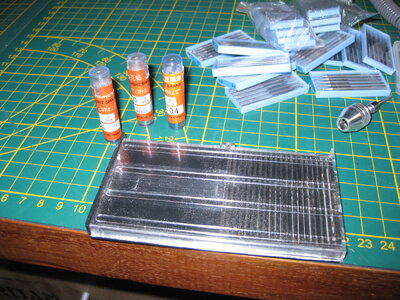While browsing many posts, daily, I came across where members are using rotary tools for various tasks. Members use these tools to shape the planks, fair the frames, not to mention as parts of the jigs, and all other tasks you can think of. Whether the rotary tool knocks out metal grinding or helps just drill the holes, it becomes one of the essential tools to look at in our tool's chest.
This thread, however, is not a buying guide, nor a review of rotary tools available at our disposal. The idea is to share\express your experience with the rotary tools you own; what you like the most, and what would turn you down to use it again. Here, we don't want to advertise brands and their products. I hope we will not discuss what tool is better and why. We shouldn't discuss the price, either. As suggested, a pure experience of yours to suffice, one of the requirements just to be honest!
I will lead this thread with the rotary tools I own, and hope others will chime in later. I think it should give a better idea for newcomers what rotary tools to choose the next Christmas or as a Birthday gift from the family.
Over the years of my ship modeling experience, I have acquired a collection of rotary tools. Some of those are old but still do an excellent daily job, and some of them are pretty new, and I rarely use them. The tools are chosen by the task I need to perform, they all have different properties as you would guess. For the relative size idea, I included the pencil on the right side.
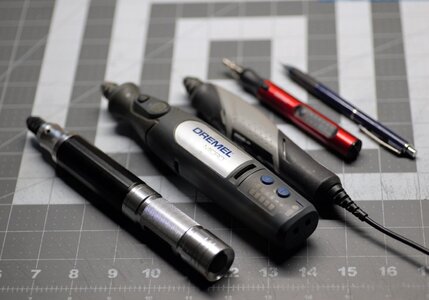
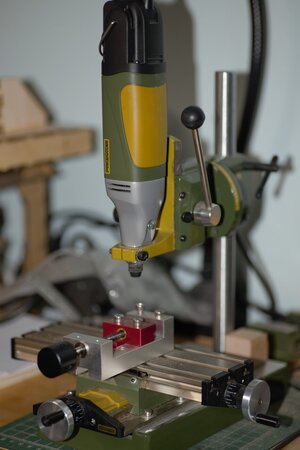
Well, this is all about the rotary tools I use. What about you folks? I am waiting for your stories and experiences with yours. What are the rotary tools in your tool's chest?
This thread, however, is not a buying guide, nor a review of rotary tools available at our disposal. The idea is to share\express your experience with the rotary tools you own; what you like the most, and what would turn you down to use it again. Here, we don't want to advertise brands and their products. I hope we will not discuss what tool is better and why. We shouldn't discuss the price, either. As suggested, a pure experience of yours to suffice, one of the requirements just to be honest!
I will lead this thread with the rotary tools I own, and hope others will chime in later. I think it should give a better idea for newcomers what rotary tools to choose the next Christmas or as a Birthday gift from the family.
Over the years of my ship modeling experience, I have acquired a collection of rotary tools. Some of those are old but still do an excellent daily job, and some of them are pretty new, and I rarely use them. The tools are chosen by the task I need to perform, they all have different properties as you would guess. For the relative size idea, I included the pencil on the right side.

- Let's start with the bottom one. It is called 'Grinder', I am not kidding, this is what the label said. It is well made, has a removable\rechable battery, and has the mini chuck key to exchange bits. I used it only a few times since it was acquired last year. Here is why: this grinder has luck on some of my preferences I wish to know while researching. The motor is very good and smooth, but the On\Off switch is located at the end and cannot be used if you require a sudden stop. One of the minor drawbacks, is you have to use a hole in the spindle housing to secure the bits in the chuck. But the main disappointment - is it doesn't have a variable speed. I use it only when I need a specific tool for a long time, for example, fairing the frames with a sanding drum.
- The next one will be my Dremel Micro. This is my working horse of all my rotary tools. It is my oldest rotary tool and I used it for most of my tasks. I cannot recall, it was a while back, but it comes with a collet system, and I instantly converted it to a chuck mostly to rapidly interchange the drill bits of various diameters. BTW, never regret doing so. I like the charging station and its compact design. My Roayl Charles Yacht was made using this toll, as I didn't have others. it does have the light around the chuck, it helps me to drill holes inside my Alert model. The only thing I would consider an inconvenience is always starting with a constant set speed, then you will have to select the one you desire. The motor is not very powerful but does the job.
- Another from the Demel family is the only wired rotary tool. I bought it unexpectedly, a few years back because it was an open box and affordable. But I fell in love instantly while using it. I believe I replaced the collet system with chuck for the same reason as the bigger brother. I bought it in mind for very delicate drilling with the smallest possible drill bit. Yes, I predrill 0.3mm holes for brass treenails on the Alert shot locker. With the minimum speed you can set, I have not broken a single drill bit, YEA! It is really small and comfortable in your hands for a long time of drilling. Also, I use it when setting the round head on the bolt's imitation, works like a charm. Its small and ergonomic design is very convenient for carving with bits. The only somewhat disappointing is the power wire, no...no.., it is long enough but...gets in your way and limits your freedom.
 But...this has been resolved with my next device.
But...this has been resolved with my next device. - The 'Red' one on top of the image, is the size of a mechanical pencil and very quiet when 'On'. Also has variable speed control, overload protection, and a rechargeable USB port. I don't think it has the potential for most work we required but...here it comes but...When I purchase this tool, it doesn't come with a collet system or the chuck. The head hole can accept any tool of 2.35mm in diameter and tighten with a hex screw on both sides. I purchased an adapter for super small drill bits, and permanently install it in the head. Now, I can use very small drill bits starting 0.2mm and use this stylish tool where it is required very gentle drilling...and no cord for convenience. Today, I see many variations of this tool, where some of them come with an In\out lock system to hold the bits.
- The last one is the Proxxon EBS (I believe). It didn't fit in the above image simply because it is permanently installed in the drill press attachment. I think it is the most powerful\ and versatile tool in my collection. It is built to last with precision in mind. It comes using the standard Proxxon collet system and variable speed control. If you read to this point, you already know that I am not a big fan of collet systems in rotary tools. It is Ok when you have all of your drill bits on the standard shaft. But what happened if you don't? I have many sizes of standard drill bits and would like to use them. Unfortunately, I couldn't add a chuck to this one, it doesn't design for the chuck replacement. Alternatively, I bought a flexible shaft and headpiece, the handpiece does come with the chuck, but... I couldn't mount the tool without causing too much noise and vibration and the flexible shaft got in my way so it is still in the closet.
 Since I didn't have a miniature drill press, I decided to convert this rotary tool into a drill press. This is still my best setup and this toll is awesome for the purpose it is suited now. Pairing with the coordinate table it makes a device of my choice still. I am using it daily for drilling, and with a special setup, I use it as the mini-lathe to fabricate trucks for gun carriages
Since I didn't have a miniature drill press, I decided to convert this rotary tool into a drill press. This is still my best setup and this toll is awesome for the purpose it is suited now. Pairing with the coordinate table it makes a device of my choice still. I am using it daily for drilling, and with a special setup, I use it as the mini-lathe to fabricate trucks for gun carriages

Well, this is all about the rotary tools I use. What about you folks? I am waiting for your stories and experiences with yours. What are the rotary tools in your tool's chest?



